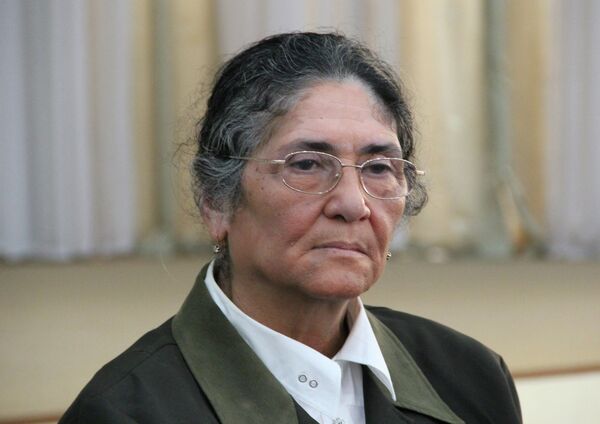DUSHANBE/MOSCOW, September 10 (RIA Novosti) – A seasoned politician and human rights advocate once convicted of treason may become the first woman to run for president in impoverished ex-Soviet Tajikistan in a race against a long-serving strongman leader.
Oinikhol Bobonazarova said Tuesday that she had become the single candidate of Tajik opposition parties to run in the November 6 election. Her goal is “changes and reforms,” the bespectacled, gray-haired former lawyer said.
She has decided to “take the burden of responsibility because there are a lot of problems in the country that the government does not solve,” she told a news conference.
Her campaign will have to collect signatures of 5 percent of Tajik voters in the nation of almost 9 million in order to get her candidacy registered.
The 65-year-old former lawyer was among the founders of the Democratic Party in the then-Soviet Republic of Tajikistan and became Central Asian nation’s first political prisoner after the 1991 Soviet collapse.
In 1993, when a civil war fueled by regional feuds raged in Tajikistan, Bobonazarova was arrested, accused of plotting a coup and convicted of “treason.” Having served several months in jail, she worked as a human rights counselor in the Tajik office of the Organization for Security and Cooperation in Europe.
She then worked at the Tajik branch of the Open Society Foundation, an international charity founded and funded by billionaire George Soros, and now heads the “Perspektiva Plus” human rights group, which defends the rights of women, prisoners and Tajik labor migrants working in Russia and Kazakhstan.
Bobonazarova is one of a handful of other hopefuls – including candidates from the Communist, Agrarian and Socialist parties – likely to run against incumbent President Imomali Rakhmon. In 2006, Rakhmon won the previous election with 79.3 percent, but the vote was criticized by international observers as unfair.
A former collective farm chairman, Rakhmon has ruled Tajikistan for almost two decades. In 1997, he brokered a deal with secular and Islamist opposition forces that ended Tajikistan’s civil war, which began in 1992 and had claimed tens of thousands of lives.
Critics accuse Rakhmon of cracking down on opponents and independent media and driving key opposition leaders out of the country or jailing them on trumped-up charges. In late July, a UN human rights watchdog criticized Rakhmon’s government, citing “reports of politically motivated harassment of opposition political leaders.”


